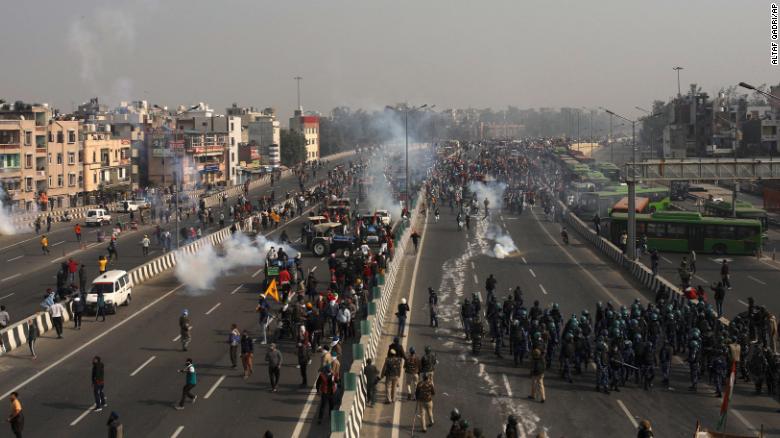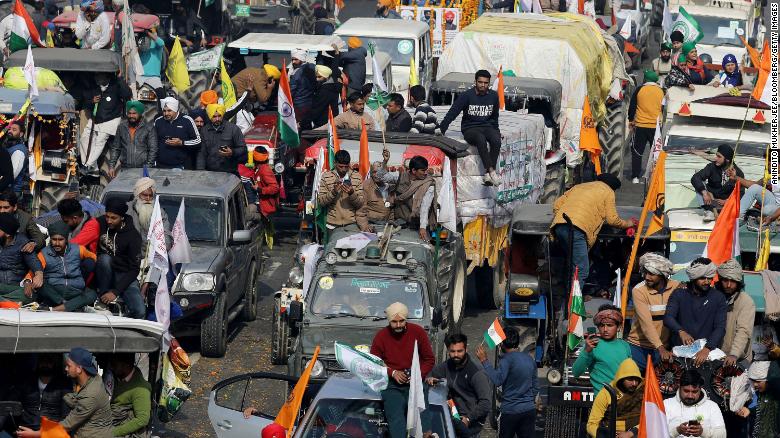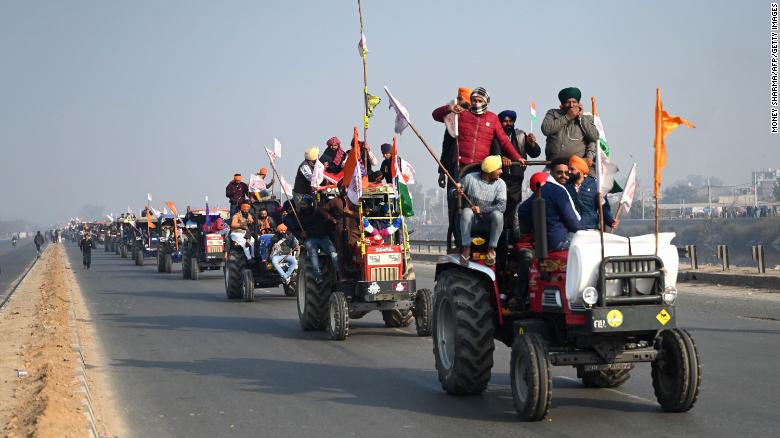Republic Day 2021: Indian farmers ramp up their protest by riding tractors into the capital

New Delhi (CNN)Hundreds of thousands of farmers drove their tractors in convoy into the Indian capital New Delhi on Tuesday, as part of ongoing, nationwide protests against controversial agricultural laws that farmers say put their livelihoods at risk.
Tear gas and flash bangs could been seen on live streams from the city's streets as police moved to contain large crowds of protestors in tractors and on foot from breaking through barricades. Both police and protesters were spotted with large sticks in the streets.
Many of the farmers, who had adorned their tractors with colorful flags, including the flag of India and various farmers unions, had been camping out in protest on the outskirts of the capital for more than two months. Others, including young farmers from the northern states of Haryana, Uttar Pradesh, Punjab and Rajasthan, had gathered on the border over the past few days in time for the planned march on India's Republic Day.
The national holiday marks the first time India's constitution went into effect in 1950 following independence from British colonial rule, and the day is annually celebrated with a huge military parade through the capital.

Police use tear gas to disperse farmers who marched to the capital during India's Republic Day celebrations in New Delhi, on January 26, 2021.
Farmers planned their march to coincide with the government's parade, which has been scaled back because of the coronavirus pandemic. The massive protests have been a significant challenge to Prime Minister Narendra Modi, as months of demonstrations and sit-ins across the country against his key agricultural policy have grown into a stalemate marked by deadlocked talks between farmers and his administration.
Police used tear gas and batons against protesters outside Delhi police headquarters and at two bordering areas of the city as some farmers broke through barricades, protesters said Tuesday.
"Outside the Delhi police headquarters tear gas and batons were used, protestors also attacked the police buses stationed there," said Paramjeet Singh Katyal, a spokesperson for Samyukt Kisan Morcha, the umbrella group representing farmers' unions.
"We have broken the barricades, we have our tractors, people are marching, some leaders are also on horseback... thousands of farmers have already reached the capital," Katyal said.

Farmers protest during a tractor rally near the Singhu border crossing in Delhi, India, on January 26, 2021.
At the Ghazipur border between Delhi and Uttar Pradesh, police used tear gas and batons to push back about 2,000 protesters, and tear gas was also used at the Singhu border between Delhi and Haryana on Tuesday morning, according to Ashutosh Mishra, a spokesperson for All India Sangharsh Coordination Committee, one of the unions leading the protests.
Dead Pixels Season 2 Episode 1 Watch Free Online
mixed-ish Season 2 Episode 1 Watch Free Online
Teen Mom OG Season 9 Episode 1 Watch Free Online
The Resident Season 4 Episode 3 Watch Free Online
The Real Housewives of Dallas Season 5 Episode 4 Watch Free Online
Although the police had given permission for farmers to hold a tractor rally in Delhi, they had placed a cap of 5,000 tractors, according to Mishra. However more than 200,000 tractors were mobilized, with many young people coming from neighboring states, said Darshan Pal, president of Krantikari Kisan Union, one of several leading the protests.
A spokesperson for the Delhi police, Anil Mittal, said they didn't have a statement regarding the clashes, only saying "we have just asked protestors to maintain peace."
For decades, the Indian government offered guaranteed prices to farmers for certain crops, providing long-term certainty that, in theory, allowed them to make investments for the next crop cycle. The new agricultural laws, first passed in September by Modi's government, instead allow farmers to sell their goods to anyone for any price -- giving them more freedom to do things such as sell directly to buyers and sell to other states.
But farmers argued that the new rules would leave them worse off by making it easier for corporations to exploit agricultural workers, and help big companies drive down prices. While farmers could sell crops at elevated prices if the demand is there, conversely, they could struggle to meet the minimum price in years when there is too much supply in the market.
The laws have been so contentious because agriculture is the primary source of livelihood for about 58% of India's 1.3 billion population, and farmers have been arguing for years to get the minimum guaranteed prices increased. They are the biggest voter block in the country -- making farming a central political issue.
More than 100,000 people have been protesting the laws since late November.
There have been sit-ins lasting days along each of New Delhi's three borders. Farmers have blocked roads and set up makeshift camps, some sleeping on the road or in their tractors. They arrived from numerous different states to participate in the mass protests, at times clashing with police.
The government has held 11 rounds of talks with leaders of more than 30 farmers' unions that are opposed to the laws -- but the talks have gone nowhere.

Farmers take part in a tractor rally as they continue to demonstrate against the central government's recent agricultural reforms in New Delhi on January 26, 2021.
Earlier this month, India's Supreme Court issued an order putting the three contentious farm laws on hold and ordered the formation of a four-member mediation committee to help the parties negotiate. But farmers' leaders have rejected any court-appointed mediation committee.
Increasing the pressure, protesters on Tuesday said as well as the three routes into the city designated by Delhi police, they intended to march at six points on the city's borders as well as in the northern states of Haryana, Rajasthan and Uttar Pradesh, according to Yogendra Yadav, a leader of the farmers' protests.
Farmers' unions also plan to march to parliament on February 1, the day that the parliament will hold its budget session, Yadav said.
To control the crowd, Delhi traffic police have created diversions along several major highways and main roads in city and the metro has shut exits at least 15 stations close to protest sites.

Vaccine Rollout Plan: Key issues still unresolved
- Vaccine Rollout Plan: Key issues still unresolved
.jpg)
Pass Oracle 1Z0-1079 Exam Questions In First Attempt
- CertsLeads enables you to prepare your certification exams, Get most actual and updated exam questions PDF for passing the certifications exam in first attempt

Bark, the herald angels sing: A first-ever Christmas song for dogs has been released
- But now dogs can join in the fun. A song that claims to be the first-ever Christmas single designed
.jpg)
Pass Salesforce Platform-App-Builder Exam Questions In First Attempt
- CertsLeads enables you to prepare your certification exams, Get most actual and updated exam questions PDF for passing the certifications exam in first attempt